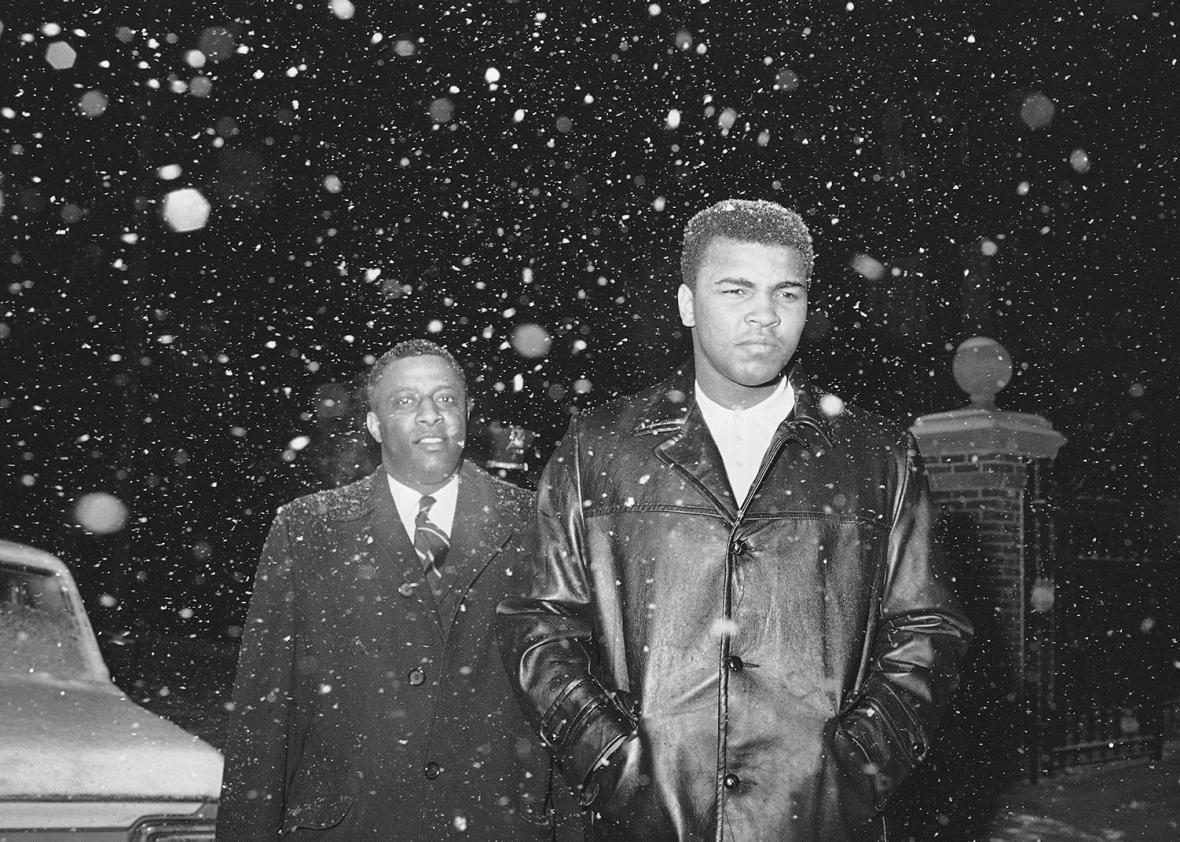“Where did you get your name from?” an immigration official asked Muhammad Ali Jr. earlier this month as the son of the legendary American boxer was reportedly detained for about two hours at a Florida airport.
“Are you a Muslim?” the official asked. And he repeated: “Where did you get your name from?”
According to the Louisville Courier-Journal, Ali Jr. said he was a Muslim, at which point “the officers kept questioning him about his religion and where he was born.” (U.S. Customs and Border Protection confirms that it held Ali Jr. but denies he was subjected to extra questioning due to his faith.)
And what about his name—where did it come from? The answer is that Muhammad Ali Jr. got his name from his famous father. And where did his father get his name? He fought for it. He earned it by making himself a champion of American values. He sacrificed the most important years of his boxing career to stand up for principles of freedom of religion and thought.
Muhammad Ali was born Cassius Marcellus Clay Jr. in Louisville, Kentucky. He was the great-grandson of slaves. In 1964, Clay announced he had joined the Nation of Islam, a religious organization that encouraged its members to cast aside their slave names, the names that had been affixed to them by their owners like cattle brands, the names that had been changed through the years on whims or on auction blocks.
When Cassius Clay first embraced the teachings of Elijah Muhammad, he was less interested in orthodox Islam than in the wisdom of the leader himself, who had changed his own name from Elijah Poole and who taught his followers that black people in America would never be treated as equals until they established their independent identities.
At first, Cassius Clay changed his name to Cassius X, like his friend Malcolm X, who had been born Malcolm Little. But Elijah Muhammad thought it important to honor the young boxer, who had recently defeated Sonny Liston to win the heavyweight championship, with a name befitting his stature. “Muhammad,” Elijah Muhammad explained, meant worthy of praise. “Ali” meant lofty. It was not by accident that Elijah Muhammad took two of the most common names in the Muslim world for his disciple. He knew the name would sound strange to American ears but that it would ring out loud and clear in the Muslim world: The heavyweight champion of the world and one of the most famous black men in America was a Muslim.
Muhammad Ali paid a price for choosing a seemingly strange religion and foreign-sounding name. Many newspapers and many of his opponents refused to call him Muhammad Ali. They mocked him. And when Ali said his religious beliefs prevented him from fighting in the Vietnam War, he was convicted of draft dodging. After fighting all the way to the Supreme Court, his conviction was overturned, but only after Ali spent hundreds of thousands of dollars in legal fees, suffered vilification in the press, and lost some of the prime years of his career.
Eventually, Ali’s courage and strength of conviction made him a hero far beyond the world of sports. It also helped make him a powerful force worldwide in promoting understanding between nations, cultures, and religions. He had a kind of legitimacy and independence unlike any other American of his time. He showed that America was big and strong enough to embrace its rebels and to tolerate differences in religion and culture. That’s why Presidents Jimmy Carter and Ronald Reagan sent Ali on diplomatic missions to Africa and the Middle East.
In 1987, on a charitable mission to Peshawar in Pakistan, the boxer told an audience:
Many people in America know nothing about Muslims. Many people in America know nothing about Prophet Muhammad. America is a big country. America is a beautiful country. All peoples, all races, religions are in America, but the power structure and the news media present a bad picture of Muslims. Whenever Muslims are mentioned, people think about Palestinian guerrilla. Whenever Muslims are mentioned, they think about Khomeini, they think about Col. Gadhafi, and whatever he may do that they consider rebellious.
My fight in the boxing ring was only to make me popular. I never enjoyed boxing. I never enjoyed hurting people, knocking people down. But this world only recognizes power, wealth, and fame. … And after hearing the powerful message of Islam, and seeing the beautiful unity in Muslims, after seeing how the children are raised, after seeing the procedures of prayer, after seeing the way we eat, the way we dress, just the whole attitude of Islam, it was so beautiful. I said, this is something more people have to know about, this is something more people would accept and join if they really understood. Whether they be black or white, red, yellow, or brown, Christian, Jew, Hindu, Buddhist, or atheist, if he hears Islam, reads the Holy Quran, hears the plain truth about Prophet Muhammad, he’ll have to be affected in one way or the other.
What American could have a problem with those words? Perhaps one who also had difficulty accepting that a man named Barack Hussein Obama could be a true American.
Muhammad Ali Jr. was born in America—Philadelphia, to be precise. His ancestors were brought here on slave ships and treated as property for generations. In 1964, his father traded his slave name for one of his own choosing, one that represented his religious beliefs, one that resonated with American values of freedom, one that would carry around the world as evidence of America’s greatest strengths.
If the name Muhammad Ali isn’t American enough for our government, then maybe it’s our government that isn’t American enough.
